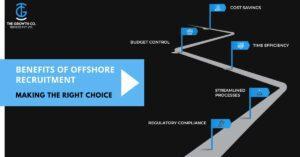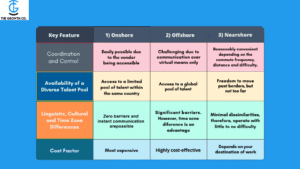In today’s globalized business landscape, companies have more options than ever when it comes to finding the best talent. Offshore recruitment and onshore recruitment are two popular strategies, each offering its distinct advantages and considerations. Understanding the key differences between these two approaches is crucial for making informed hiring decisions that align with your company’s goals and budget.
In this blog, we focus on understanding the key differences between offshore and onshore recruitment, empowering you to make informed decisions based on your specific business needs. By the end, you’ll have a solid foundation for exploring outsourcing strategies that boost your talent acquisition success.
What is Outsourcing?
Outsourcing is a business strategy where a company contracts with an external provider to handle tasks or functions that were previously performed internally. This approach is often adopted to reduce costs, improve efficiency, and allow the company to focus on its core strengths
Onshore and offshore recruitment are the two main types of outsourcing.
Each type of outsourcing presents specific advantages and considerations for businesses, which we’ll explore further.

What is Offshore Recruitment?
Offshore recruitment involves partnering with a recruitment agency or directly hiring employees located in a different country than your company’s headquarters. This strategy taps into a vast global talent pool, offering access to diverse skill sets and often lower labor costs.
What is Onshore Recruitment?
Onshore recruitment focuses on hiring employees within the same country or region where your business operates. This approach often emphasizes local market knowledge, cultural fit, and potentially faster on boarding processes. Onshore recruitment is defined as outsourcing of business processes to a company in the same country as the one that does the outsourcing.
Key Differences to Consider While Choosing the Right Model for Your Business

Cost Efficiency:
One of the key advantages of offshore talent sourcing is its cost effectiveness. Hiring talent from regions with lower labor costs can significantly reduce recruitment expenses, overheads, and operational costs without sacrificing the quality of hires. Collaborating with the right offshore RPO partner has enabled businesses to slash overhead expenses by up to 60%. Moreover, offshore recruitment opens doors to international talent, fostering diversity and fresh perspectives within organisations.
Onshore recruitment may have higher costs but can offer potential savings on training and integration. Setting up and maintaining an in-house recruitment team involves significant expenses, including salaries, benefits, infrastructure, and technology.
Flexibility and Scalability:
Offshore: Offshore recruitment provides flexibility and scalability, allowing organizations to easily adjust the scale of operations based on the evolving needs of the business.
Onshore: Onshore recruitment may have limitations in terms of scalability due to factors such as competition for talent in the local market dynamics.
Communication & Time Zones:
Offshore recruitment involves managing communication across different time zones and potential language barriers. Offshore recruitment agencies often have dedicated account managers or communication specialists to bridge these gaps for their clients, ensuring a smoother experience.
Onshore hiring allows for easier collaboration and communication due to shared time zones and cultural similarities. Typically, you’ll share similar working hours with onshore recruiters and candidates, enabling real-time communication during business hours.

Cultural Fit:
Candidates from a similar cultural background are more likely to integrate quickly with existing teams, fostering collaboration and a strong sense of belonging, so onshore candidates may have an edge as they share a common cultural context, including workplace norms, communication styles, social cues, and expectations. This understanding minimizes miscommunication and promotes smoother onboarding. This can also be achieved by engaging an offshore partner who already has extensive experience in cross-cultural assignments.
Onboarding offshore hires necessitates sensitivity training and fostering cultural awareness within the company. Diverse perspectives and cultural backgrounds can foster innovation and creativity, particularly in global organizations that value a multicultural environment.
Regulatory Compliance:
Onshore recruiters have thorough knowledge of local employment laws, such as minimum wage, overtime, benefits, discrimination, and benefits from familiarity with regulations, reducing the risk of legal hurdles.
Offshore: Navigating legal and regulatory frameworks in offshore locations requires thorough understanding and compliance to prevent potential legal complications. It is important to engage a local offshore firm to assure local compliances.
Important Note: Even within onshore recruitment, regional differences in regulations can exist, especially in large countries. Thorough understanding of local employment laws remains crucial.
Talent Pool:
Offshore recruitment taps into global skillsets, potentially giving you access to specialized talent not readily available locally. Offshore recruitment can uncover exceptional candidates who may not be actively searching for opportunities in your primary markets. Accessing talent hubs specializing in different industries allows companies to source niche skills that might be scarce locally.
High demand for specialized skills in competitive markets can make it challenging to find the ideal onshore candidate quickly, potentially leading to bidding wars for top talent.
Quality Assurance
Both onshore and offshore outsourcing offer quality assurance benefits, but prioritize them differently. Onshore outsourcing often excels in customized instruction and collaborative problem-solving due to proximity and cultural alignment. If hands-on training or immediate issue resolution is critical for your quality standards, an onshore partner might be ideal.
Offshore outsourcing frequently emphasizes pre-established expertise and standardized quality processes. Offshore companies often have rigorous quality control systems in place and may offer access to specialized skills or technologies that enhance overall quality. If you need consistent, well-defined results or niche expertise, offshore outsourcing can be a strong choice.
When to Choose Offshore vs. Onshore Recruitment
The best strategy depends on your specific needs:
Offshore is ideal for:
o Companies whose main priority is cost reduction
o Seeking highly specialized skillsets
o Expanding into new markets
Onshore is ideal for:
o Roles demanding strong cultural alignment
o Positions requiring frequent in-person interaction
o Prioritizing fast onboarding
The decision between offshore and onshore recruitment depends on your company’s unique needs. Consider:
Budget: If cost reduction is a main priority, offshore recruitment may be attractive.
Skills Required: If you require highly specialized skills, widening your search offshore may be necessary.
Time-Sensitivity: For urgent hiring, onshore recruitment can offer faster turnaround times due to time-zone alignment.
Importance of Cultural Fit: Roles with substantial client or team interaction might benefit from onshore candidates who share the same cultural context.

Which is better: onshore or offshore?
All that being said, the age-old question remains: which is better, onshore or offshore? Is answering the offshore vs onshore worth it? The answer can be found within the company, to be exact.
Business leaders and the management can tell which of these they need more. If onshoring is better for them, why would they try to offshore? The same goes for offshore ventures.
Employees should have a say in the decision, too, as their work can be affected by this drastic decision.
Choosing between offshore and onshore recruitment (and even a hybrid model) requires careful consideration of your business’s unique needs. By weighing the key differences outlined in this blog, you’ll be well-equipped to make strategic hiring decisions that support your growth and success.
Ready to optimize your recruitment strategy? Contact TGC Staffing today. Our expert recruiters can help you build a customized plan that leverages the strengths of both offshore and onshore talent acquisition.
Schedule a free consultation now!


